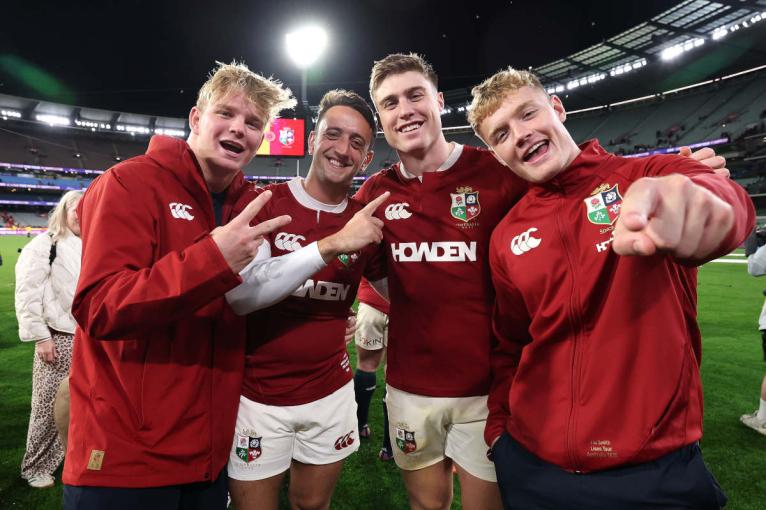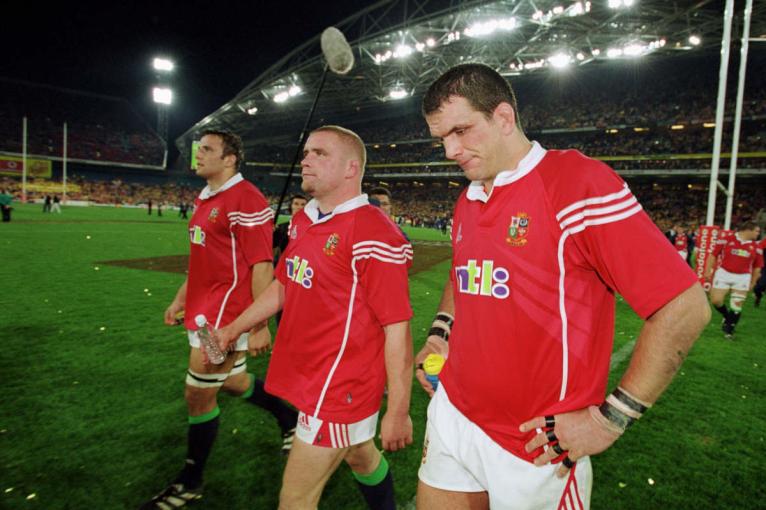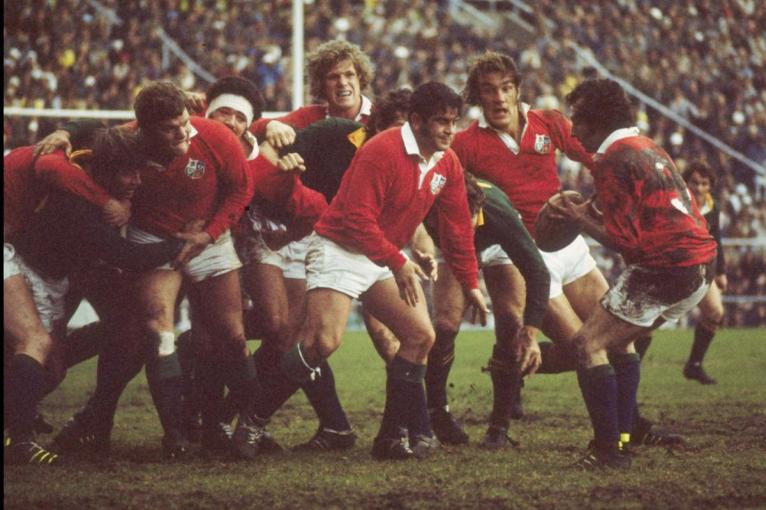Henry Pollock is not a man who does demure. On and off the pitch, the England and Lions forward catches the eye. A celebratory gesture here, a soundbite there, the 20-year-old is like many young men of his age: gushing with self-confidence.
On the eve of the Test series against Australia, Pollock declared that the ambition of the tourists was to “be the best Lions team ever”. It was a topic of conservation in the dressing room, added the Englishman, “and 3-0 is definitely on the table.”
In other words, whitewashing the Wallabies would make the Lions of 2025 the greatest vintage since the first tourists embarked down under in 1888. It was a theme continued by some journalists after the Lions clinched the series with the thrilling second Test win.
Victory in the third Test would assure the 2025 Lions of legendary status, the first to secure a series whitewash since the Lions beat Argentina 4-0 in the 1927 series. Woah! Back up a minute.

Is this the same tour that the Lions’ unofficial historian, Clem Thomas (a Lion in 1955), omitted from his superlative history of Lions tours in 1996 because he regarded the tour as so insignificant? The same tour in which the Argentines managed to score three points in four Tests, while conceding 160 points (in the days when a try was worth three points)?
Argentina was not a serious rugby nation in 1927. It had only ever before played one Test match – against the 1910 Lions – and it wouldn’t start playing regular international rugby for another 25 years.
Australia were far better than all the pundits predicted but it was still the Australia team who two years ago failed to reach the knockout phase of the World Cup.
As it turned out, the Lions of 2025 lost the third Test to Australia, so we were mercifully spared all the tenuous comparisons with 1927. Andy Farrell’s boys will be remembered as a good squad but not to be bracketed with the great sides of 1971, 1974, 1989 and 1997.
Australia were far better than all the pundits predicted but it was still the Australia team who two years ago failed to reach the knockout phase of the World Cup. It was also a Wallabies side missing some key players for all or part of the series – Rob Valetini, Will Skelton and Noah Lolesio.
The last Lions side to wrap up a series after two Tests was Martin Johnson’s 1997 squad in South Africa. They were expected to be ripped to bits by a Springboks side that had won the World Cup two years earlier. Jeremy Guscott, who dropped the winning goal in the second Test win in Durban, recalled: “In ’97, we were underdogs and Louis Luyt (then president of the South African Rugby Union) said as much when we arrived at the airport in Johannesburg: ‘Thanks for making up the numbers guys. We’ll show you in and we’ll show you out’.”
The 1989 Lions faced a Wallabies side in transition, moving from one talented generation (losing the 1987 World Cup semi-final to France in the last minute) to another (winning the 1991 World Cup). The tourists lost the first Test but won the next two to become the first (and to date, only) Lions side to take a series having lost the opener.

The next Lions tour to Australia was in 2001 and this time it was the Wallabies who fought back to win the series after losing the first Test. The bulk of the Australia side had won the World Cup two years earlier, and among them were John Eales, George Gregan, Matt Burke and Joe Roff, some of the finest players to ever wear the gold shirt.
The Lions also boasted some greats of the game: Rob Howley, Brian O’Driscoll, Tom Smith, Keith Wood, Martin Johnson, Richard Hill and Jonny Wilkinson. How many of the 2025 Lions would have got into the 2001 Lions Test side? Probably two: Maro Itoje in place of Danny Grewcock and Tadhg Beirne for Martin Corry.
But few people remember the 2001 Lions because they lost the series. Similarly, the 2017 Lions were an outstanding side, and in drawing the series with the All Blacks (then reigning back-to-back world champions) they became only the second of 12 Lions squads to return undefeated from New Zealand.
Gareth Edwards, who played in both the 1971 and 1974 series wins, said in 2019: “It is difficult to measure teams from generation to generation.”
They are not mentioned in the same breath as the first, the 1971 Lions, who beat the All Blacks 2-1 with the fourth and final match drawn. It was a superb achievement, as was the Lions’ series victory in South Africa three years later.
These sides are hailed as the greatest Lions ever, but are they? Can we meaningfully compare rugby players separated by half a century? Gareth Edwards, who played in both the 1971 and 1974 series wins, said in an interview in 2019: “It is difficult to measure teams from generation to generation.”

He gave his own position as an example. “Defensively, teams have become so hard to break down through the middle, so if a scrum-half can create doubt, while still doing the basics well, then all the better.” That was why, Edwards continued, he was so excited by a young Frenchman. “I like the look of Antoine Dupont…he looks athletic and very sharp, the sort of player who can look for their own try and also set up the game.”
Edwards had the same talent and the same physique as Dupont has; had he been born 50 years later he would have been a star of the professional game. But would many of his former Lions’ team-mates? Several threequarters, most likely, including JPR Williams, David Duckham and Phil Bennett. Possibly Barry John, although he might have struggled with the physicality of the modern game. In a 2008 interview JPR Williams said that if he had his time again, he would have chosen tennis (he was a talented youth player) instead of rugby because today the sport is “much more physical than when I played.”
This is particularly true in the forwards, where rugby has undergone its most profound changes in the last half a century. The set-piece and the breakdown are unrecognisable from 50 years ago; they’re practically unrecognisable from 25 years ago.
To beat the All Blacks and the Springboks is an achievement in itself; to beat them with a hangover takes a special talent.
In 2022 the British Medical Journal published a paper about the anthropometric changes in elite professional rugby union players between 1999 and 2018. It concluded: “With each season played, player body mass, fat-free mass and maximum speed increased significantly, while per cent fat decreased…Players’ momentum in 2019 was 14% more than those playing in 1999. In the Front Five, momentum increased in this period by >25%.”
Imagine what the difference in momentum performance would be between 1974 and 2025.
As Gareth Edwards said, it’s very difficult to compare one era with another because of the way rugby – and its players – have changed. That includes off the field where, if the stories are to be believed, the Lions of the 1970s were a thirsty bunch. Perhaps then that does make them the greatest: to beat the All Blacks and the Springboks is an achievement in itself; to beat them with a hangover takes a special talent.


Sure we can. Great athletes would be great in any era.
So you make it about comparing the achievements and not the players. The ‘71 and ‘74 Lion's still deserved to be ranked no.1 because their achievement(s) have not been matched and especially the ‘74 side, is not ever likely to be so, as there will never be a four test series again. That series win 3 wins, 1 drawn ( only because coincidentally it was refereed by a Sth African official), IMHO is the equal of a WC winning campaign. The great players involved reached iconic status because of their achievements and that cannot ever be removed by player comparison.
P.S. as an one eyed All Black fan, I just want to say by 1971 we had come to the end of a decade of world dominance and were at a transitional stage that timing wise, the Lion's sneakily were able to take advantage of lol.
Actually, this is just irritating. Of course fans of different generations and even just current fans who have watched all the recordings will love to do this with their friends and peers. They will also realise that it is mere frivolous entertainment and pleasant reminiscing.
Time is irrelevant, Meads/John/Gerber/Campese would still have been great players irrespective of whether they trained full time or not. But its folly to compare era’s between a farmer/Dr/coal miner with a fulltime pro - Amateur era vs Professional era, and never the twain shall meet.
Can we meaningfully compare players separated by half a century?
No… Next topic…
Would be an absolite disgrace to the Lions of past time to be compared to these lot.
Barely beat a team ranked 7th in the world?
50% of the Lions, Scotland and Wales, are ranked far lower than Australia.
6th.